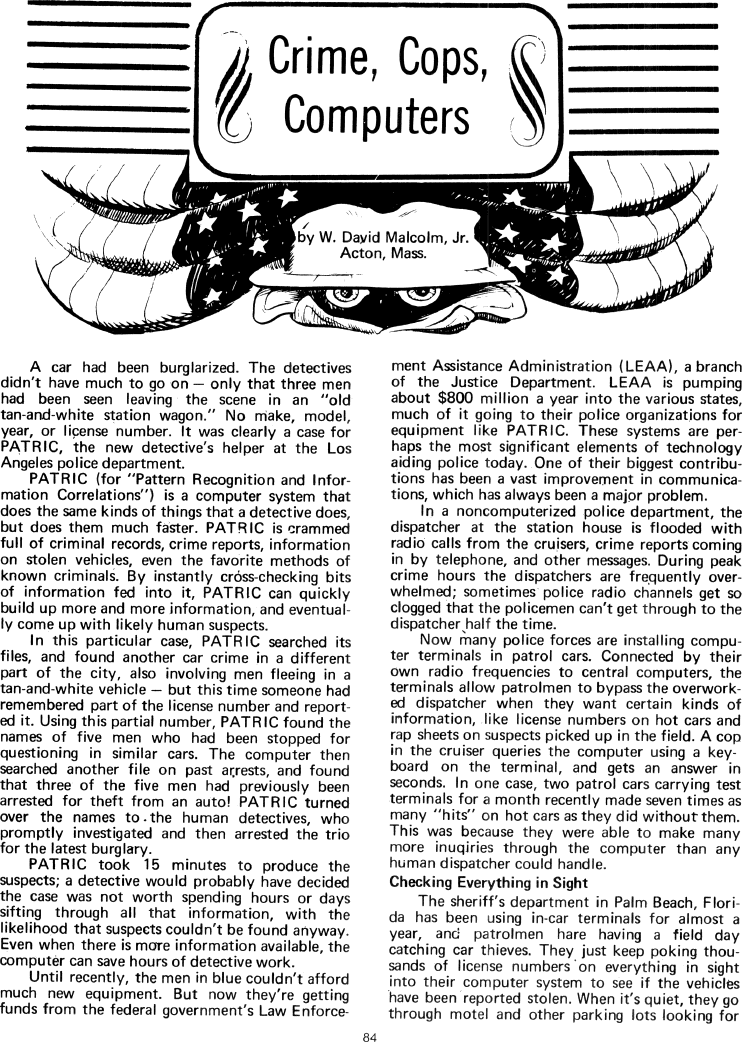The Best of Creative Computing Volume 1 (published 1976)
Crime, Cops, Computers (PATRIC (Pattern Recognition and Information Correlations) computer system, criminal records, detectives)

Crime, Cops, Computers
by W. David Malcolm Jr.
Action, Mass.
A car had been burglarized. The detectives didn't have much to go on -- only
that three men had been seen leaving the scene in an "old tan-and-white station
wagon." No make, model, year, or license number. It was clearly a case for
PATRIC, the new detective's helper at the Los Angeles police department.
PATRIC (for "Pattern Recognition and Information Correlations") is a computer
system that does the same kinds of things that a detective does, but does them
much faster. PATRIC is crammed full of criminal records, crime reports,
information on stolen vehicles, even the favorite methods of known criminals. By
instantly cross-checking bits of information fed into it PATRIC can quickly
build up more and more information, and eventually come up with likely human
suspects.
In this particular case, PATRIC searched its files, and found another car crime
in a different part of the city, also involving men fleeing in a tan-and-white
vehicle -- but this time someone had remembered part of the license number and
reported it. Using this partial number, PATRIC found the names of the five men
who had been stopped for questioning in similar cars. The computer then searched
another file on past arrests, and found that three of the five men had
previously had been arrested for theft and from an auto! PATRIC turned over the
names to the human detectives, who promptly investigated and then arrested the
trio for the latest burglary.
PATRIC took 15 minutes to produce the suspects; a detective would probably have
decided the case was not worth spending hours or days sifting through all that
information, with the likelihood that suspects couldn't be found anyway. Even
when there is more information available, the computer can save hours of
detective work.
Until recently, the men in blue couldn't afford much new equipment. But now
they're getting funds from the federal government's Law Enforcement Assistance
Administration (LEAA), a branch of the Justice Department. LEAA is pumping about
$800 million a year into the various states, much of it going to their police
organizations for equipment like PATRIC. These systems are perhaps the most
significant elements of technology aiding police today. One of their biggest
contributions has been a vast improvement in communications, which has always
been a major problem.
In a noncomputerized police department, the dispatcher at the station house is
flooded with radio calls from the cruisers, crime reports coming in by
telephone, and other messages. During peak crime hours the dispatchers are
frequently overwhelmed; sometimes police radio channels get so clogged that the
policemen can't get through to the dispatcher half the time.
Now many police forces are installing computer terminals in patrol cars.
Connected by their own radio frequencies to central computers, the terminals
allow patrolmen to bypass the overworked dispatcher when they want certain kinds
of information, like license numbers on hot cars and rap sheets on suspects
picked up in the field. A cop in the cruiser queries the computer using a
keyboard on the terminal, and gets an answer in seconds. In one case, two patrol
cars carrying test terminals for a month recently made seven times as many
"hits" on hot cars as they did without them. This was because they were able to
make many more inquiries through the computer than any human dispatcher could
handle.
Checking Everything in Sight
The sheriff's department in Palm Beach, Florida has been using in-car terminals
for almost a year, and patrolmen are having a field day catching car thieves.
They just keep poking thousands of license numbers on everything in sight into
their computer system to see if the vehicles have been reported stolen. When
it's quiet, they go through motel and other parking lots looking for


